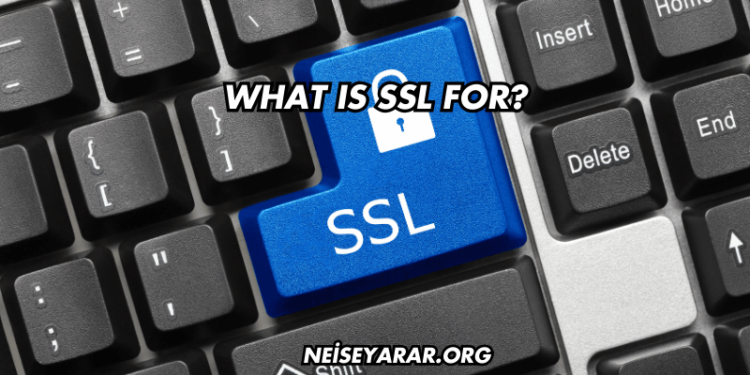SSL, short for Secure Sockets Layer, is a standard security protocol designed to establish an encrypted connection between a web server and a browser. This ensures that any data transmitted between the two remains private and secure. SSL plays a critical role in safeguarding sensitive information, such as login credentials, credit card details, and other personal data, from potential hackers and cyber threats.
What Is SSL For?
Understanding how SSL works is key to appreciating its importance in online security. When a user visits a website with SSL, the browser and the web server engage in a handshake process. This handshake involves the exchange of encryption keys, which are used to establish a secure and encrypted connection. Once this connection is set up, any data exchanged is protected, preventing unauthorized access or tampering.

Why Is SSL Important for Websites?
SSL is essential for websites because it protects users’ data and ensures secure communication. Without SSL, sensitive information transmitted over the internet is vulnerable to interception. Moreover, search engines like Google prioritize websites with SSL, giving them higher rankings and boosting their credibility. Websites without SSL may display warnings to users, discouraging them from proceeding further.
Types of SSL Certificates
There are several types of SSL certificates available, each catering to specific needs. Understanding these types can help businesses choose the right one for their website.
- Domain Validation (DV) SSL: Provides basic encryption and is suitable for small websites or blogs.
- Organization Validation (OV) SSL: Offers enhanced security and verifies the organization behind the website.
- Extended Validation (EV) SSL: Delivers the highest level of trust by displaying a green address bar in the browser.
- Wildcard SSL: Secures a domain and all its subdomains with a single certificate.
- Multi-Domain SSL: Protects multiple domains with one certificate.
How to Obtain an SSL Certificate
To acquire an SSL certificate, website owners can follow a straightforward process. First, they must determine their website’s requirements and choose an appropriate type of SSL certificate. Next, they can purchase the certificate from a trusted Certificate Authority (CA). Once acquired, the certificate needs to be installed on the server, and the website must be configured to use HTTPS.
Benefits of Using SSL
SSL offers numerous benefits beyond just encryption. It builds trust among users by showcasing a secure padlock icon in the browser, indicating that the website is safe to use. SSL also enhances website performance by enabling HTTP/2, which speeds up page loading times. Additionally, having SSL can help businesses comply with data protection regulations, such as GDPR.

Frequently Asked Questions
SSL can be a complex topic for many users, leading to a variety of questions. Below are answers to some commonly asked questions to help clarify its purpose and importance.
Why is SSL necessary for my website?
SSL is necessary to secure the data exchanged between your website and its users. It prevents unauthorized access to sensitive information, builds trust among visitors, and ensures compliance with search engine and regulatory requirements. Moreover, websites without SSL may lose credibility and visibility due to browser warnings and lower search engine rankings.
What happens if my website does not have SSL?
If your website lacks SSL, the data transmitted between your users and the server is vulnerable to interception by hackers. Additionally, modern browsers display warning messages for websites without SSL, discouraging users from accessing them. This can lead to a loss of traffic, trust, and potential revenue.
Can SSL improve my website’s search engine ranking?
Yes, SSL can improve your website’s search engine ranking. Search engines like Google prioritize secure websites in their rankings, considering SSL as a factor for trustworthiness. Websites with HTTPS are more likely to rank higher in search results than those without.
What is the difference between SSL and TLS?
SSL and TLS (Transport Layer Security) are both protocols for encrypting communication on the internet. TLS is the successor to SSL and offers improved security and performance. While the term SSL is still widely used, most modern SSL certificates actually use the more secure TLS protocol.
How do I know if a website has SSL?
You can determine if a website has SSL by looking for a padlock icon in the browser’s address bar and checking if the URL begins with “https://” instead of “http://”. These indicators show that the website has a secure connection established through SSL.







